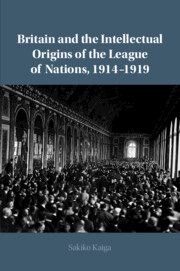Book contents
- Britain and the Intellectual Origins of the League of Nations, 1914–1919
- Britain and the Intellectual Origins of the League of Nations, 1914–1919
- Copyright page
- Contents
- Acknowledgements
- Abbreviations
- Introduction
- 1 Precursors
- 2 The Use of Force to Prevent War?
- 3 Strategies for Winning Public Opinion
- 4 A Transnational Movement?
- 5 No Peace without Victory
- Conclusion
- Appendix
- Bibliography
- Index
Introduction
Published online by Cambridge University Press: 27 April 2021
- Britain and the Intellectual Origins of the League of Nations, 1914–1919
- Britain and the Intellectual Origins of the League of Nations, 1914–1919
- Copyright page
- Contents
- Acknowledgements
- Abbreviations
- Introduction
- 1 Precursors
- 2 The Use of Force to Prevent War?
- 3 Strategies for Winning Public Opinion
- 4 A Transnational Movement?
- 5 No Peace without Victory
- Conclusion
- Appendix
- Bibliography
- Index
Summary
Thus begins the Covenant of the League of Nations of 1919. At the outset of the preamble, the Covenant stipulated the obligation of states not to resort to war as a means to preserve peace. For the first time, war – more precisely, initiating war – was in effect made illegal and the idea of collective security was institutionalised.2 It was, historians have tended to suggest, achieved due to war-weariness, the horrors of the long, grinding war, great-power diplomacy or the personal project of the US President Woodrow Wilson.3 While all these factors played important roles in founding the first international organisation for peace, this book reveals that the League originated intellectually from the little-appreciated pro-league movement in Britain and the unexpected development and consequences of its idea during the Great War.
- Type
- Chapter
- Information
- Publisher: Cambridge University PressPrint publication year: 2021

